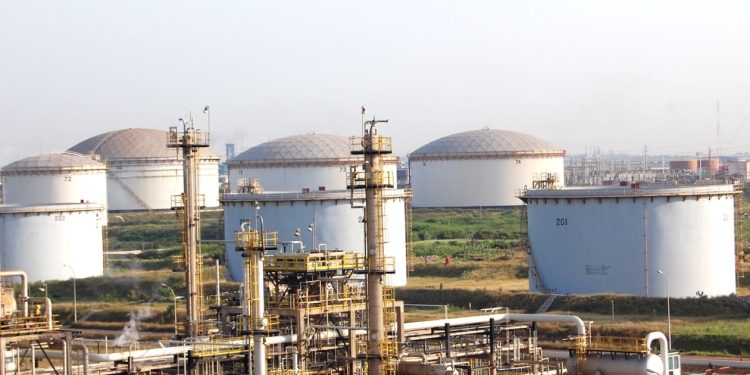n the heart of Tema, a city that stands as a testament to Ghana’s industrial aspirations, lies a fading star—The Tema Oil Refinery (TOR). Once a beacon of hope and a symbol of national pride, TOR is now teetering on the edge of oblivion.
And now, as if to add a tragic final act to this unfolding drama, the Sentuo Oil Refinery (SOR), a $1.98 million USD private investment with a capacity of 5 million metric tons per annum, is set to begin operations right under the nose of TOR in September 2023. This could very well be the last straw that breaks the camel’s back, the final nail in TOR’s coffin.
This opinion piece serves as a clarion call to our leaders and fellow Ghanaians. It’s a plea wrapped in sadness, urgency, and unyielding love for our country. We must not let TOR fade into the annals of forgotten glories.
The Sentuo shadow: A looming existential threat
It’s with a heavy heart that we must acknowledge the emergence of the Sentuo Oil Refinery. While private sector investment in our country should be a cause for celebration, the advent of this Chinese refinery casts a long, sorrowful shadow over TOR. Sentuo threatens to eclipse our national refinery, to render it obsolete, and in doing so, take away a piece of our national identity. The very existence of Sentuo Oil Refinery serves as a grim reminder of what we stand to lose—our self-reliance, our national pride, and our strategic assets.
The legacy of TOR: A pillar of national pride
Founded in 1963 as the Ghanaian Italian Petroleum (GHAIP) Company, TOR was a statement to the world that Ghana could be self-reliant, and that we could refine our destiny, quite literally. When the Government of Ghana took over in 1977, TOR became more than an industrial unit; it became a symbol of our sovereignty. Over the years, TOR has evolved, adding a Residue Fluid Catalytic Cracking facility in 2002 to its original hydro skimming plant. Its mission has been unambiguous: to provide Ghana with an uninterrupted supply of petroleum products in an efficient, cost-effective, and environmentally friendly manner.
The bitter irony: A land of oil but a dying refinery
Ghana is not a barren land; we are rich in oil resources. A nation rich in oil resources with proven reserves of 660 million barrels and an additional 2 billion barrels in unproven reserves, yet we find ourselves ensnared in a web of economic constraints that force us to import refined petroleum products worth over 400 million USD every month.
This staggering sum, nearly $5 billion annually, could be invested in healthcare, education, and infrastructure, potentially lifting millions out of poverty and setting Ghana on a path to economic freedom. The root cause of this tragic situation is poor leadership, as successive governments have failed to invest adequately in the Tema Oil Refinery (TOR), a national asset and symbol of Ghana’s potential.
This failure of vision has left TOR to decay, even as a new Chinese refinery like the Sentuo Oil Refinery rise to fill the void. According to industry experts, Ghana has the potential to generate over $20 billion in revenue annually from its oil resources alone, money that could transform the lives of ordinary Ghanaians.
Yet, the cruel irony is that TOR, which should be thriving in this environment, is languishing. This is not just an economic dilemma; it’s a national tragedy that tears at the very fabric of our identity.
The strategic imperative: Why TOR must live
Located strategically, TOR has unique advantages that should make it a cornerstone of our energy policy. It is supposed to serve our domestic market that consumes about 3 million Metric Tons of refined petroleum products annually. Moreover, TOR plays a pivotal role in the operations of the Bulk Oil Storage and Transportation (BOST) Company Limited. It manages strategic reserves and undertakes the bulk distribution of refined petroleum products.
The decline of TOR would not just be a loss of machinery, capital-intensive equipment, and revenue; it would be a catastrophic failure due to a lack of leadership, strategy, and foresight. Let us not forget the human element—the workforce that has been the backbone of TOR. These are not mere numbers on a payroll; these are lives, families, and dreams. The decline of TOR is a direct hit to the livelihoods of these hardworking Ghanaians, who have given their sweat and blood to this national asset.
A nationalistic plea
As Ghanaians, we must rally to save TOR. This is not just about economics; it’s about who we are as a people. It’s about our ability to stand tall in the community of nations, proud of what we can achieve. To let TOR die would be to let a piece of Ghana die. It would be to admit that we, as a nation, are willing to let go of our heritage, our pride, and our future.
A clarion call to our leaders
This is not just a mere opinion piece; this is a heartfelt plea, a clarion call echoing from the depths of our national soul. The Tema Oil Refinery (TOR) is not just an industrial complex; it’s a living, breathing embodiment of our national aspirations, our dreams, and our capabilities. Its decline is not just a line item on an economic report; it’s a blot on our collective conscience.
Firstly, TOR’s ability to serve the domestic market of the needed refined petroleum products annually is not in doubt. It has the potential to minimize our dependency on foreign oil products, thereby stabilizing our economy. The decline of TOR means a rise in imports, a blow to our trade balance, and a dent in our economic sovereignty.
TOR is strategically located, to serve not just Ghana but potentially the entire West African sub-region. It has the infrastructure, the expertise, and the capacity to be a hub for petroleum refining in West Africa. Imagine the geopolitical leverage and the economic dividends that such a position would offer. Are we willing to squander such a strategic asset? As leaders, you are the custodians of our social contract. When TOR was built, it was with the promise of industrialization, job creation, and national development. To let it die would be to break that promise, to fail in your duty to protect and nurture our national assets for the greater good of all Ghanaians.
Beyond economics and strategy, there’s a moral dimension to this. TOR’s workforce consists of dedicated, hardworking Ghanaians who have given their best years to this institution. What message are we sending to them and to the teeming youth studying engineering in our various universities who look up to you for guidance and survival after school? That their labor, their dedication, and their dreams are expendable?
Finally, great leaders are remembered not just for the wealth they amassed or the power they wielded, but for the institutions they built and nurtured. Your legacy, dear leaders, is intrinsically tied to the fate of TOR. Will you be remembered as the leaders who stood by and watched as a national treasure crumbled? Or will you be the visionaries who saw the bigger picture and acted decisively to save a critical piece of our national identity?
This is your moment, a defining juncture in our nation’s history. It’s a test of your leadership, your foresight, and your commitment to the Ghanaian dream. We, the people of Ghana, are watching, hoping, and praying that you will rise to this challenge. Let this not be a chapter in our history that we look back upon with regret but let it be a turning point, a moment when we came together as a nation to save something precious.
So, esteemed leaders, hear this clarion call. Act now to save the Tema Oil Refinery, to save jobs, to save our economic future, and above all, to save a piece of our Ghanaian soul. The clock is ticking, and history is watching. What will your legacy be?
Conclusion: The time to act is now
As we stand on the precipice, looking down at the possible extinction of a national treasure, we must make a choice. Will we be the generation that let TOR die, or will we be the ones who breathed new life into it? This is our moment, our challenge, and our duty.
Let us rise to it, not just as policymakers or workers but as Ghanaians. For the story of TOR is our story, a story that must not end in tragedy but in triumph. So let this be our clarion call, echoing through the halls of power and the streets of our nation. Let us save TOR, and in doing so, let us save a piece of ourselves.










Discussion about this post